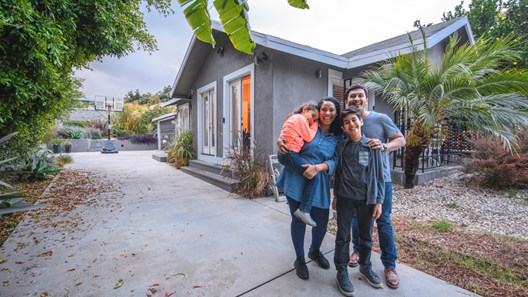Introducing Purchase Perks! Save $1,000 on closing costs when you purchase with us.
Whether you're looking for a new home, refinance your existing property, or get cash from your home's equity, we've got customized loans for your needs. Talk to a loan officer today.
As A Freelancer, How Do I Buy a House? What Can I Afford?
Read Time: 5 Minutes
|December 1, 2022
As a freelancer, you enjoy working at your own pace and all of the benefits that come with that, but, what happens when you want to buy a home and need a W2 or other traditional income documents?
The good news is that you potentially still have options.

Freelancers are more and more essential members of the economy, recognized more and more. As you research home loans catering to freelancers and gig workers, you’ll hear the term “non-QM,” meaning non-qualified.
The name is a little misleading – as a freelancer or gig worker, you probably bring home an income on the same level as you would with a W2 full-time job, meaning you certainly can qualify! Non-QM refers to the fact that the rules for the loan don’t adhere to the usual mortgage loan standards of requiring traditional income documents, again, namely that standard W2 form.
Calculating What You Can Afford
Before contacting a lender it’s a good idea to play with numbers to find out what you can afford, look around at properties, and judge if you’re ready to get prequalified. Being prepared means you’ll know what to expect when speaking with a loan officer and won’t be potentially blindsided as the loan officer explores options with you and lets you know how much you can qualify for realistically.
One of the biggest deciding factors in how much you can borrow to buy a home will be your debt-to-income ratio, known as your DTI.
Your DTI can be calculated using an online calculator or a simple formula – add up all financed expenses in your life. That can include:
- Minimum credit card payments
- Auto loan(s)
- Student loans
Then add up a few others if you have them.
- Rent/mortgage
- Child support payments
- Other loans or lines of credit such as personal loans
You don’t have to include utilities, health insurance, gas, groceries, or other usual expenses.
Once you’ve added up these factors and received the total, divide it by your gross monthly income – that’s your income without taxes taken out.
There are some general guidelines to keep in mind, if you are a freelancer or not.
- Your mortgage should take up 28% or less of your monthly budget.
- Your debt-to-income ratio (DTI) should sit at 36% or less before exploring options for home loans.
- Before entering the homebuying journey you should have three months of estimated housing payments and expenses saved up, should you experience a life change or emergency.
Remember your affordability factors.
“Affordability factors” include a few different items unique to each borrower’s situation.
- Annual income
- Down payment
- Credit score
- Location of the property to be purchased
- Interest rate
- Property tax
- Debts
- Savings
Annual Income
To determine your income as a freelancer your loan company will likely ask for bank statements (sometimes called a “bank statement loan”). This requirement foregoes the usual looking at W2s from your employer to verify your income and instead look at deposits into your bank account as you draw down from your freelance jobs.
Down Payment
The larger the initial down payment, the lower your monthly payments will be to pay off the loan within the timeframe of your agreed loan term. Paying a larger down payment can actually also help you afford a more expensive home by giving you more space in terms of your monthly payments.
Credit score
Of course, a lender will look at your credit score to get an idea of how much debt you can take on and how reliably you’ll be able to pay it back. The better your credit score, the better the lender will feel about the request.
Location and Property Tax
The location of the property you want to buy will affect a few variables including whether HOA fees will need to be included, property taxes, and the value of the property itself, all of which will affect the cost of the loan.
Interest Rate
Your interest rate will make an impact as it compounds over time, affecting your overall purchasing power.
Debts
Of course, comparing your income to what you owe will show how much you’ll be able to afford in terms of taking on a mortgage loan.
Savings
Your loan company will want to know that you aren’t putting every available dollar toward your down payment, closing costs, and initial payments – you will need some rainy-day cash still put aside for emergencies and life events, plus your usual living budget, the expenses you’re used to such as utility bills, grocery bills, and your usual commitments.
Sources:
- https://www.nerdwallet.com/mortgages/how-much-house-can-i-afford/calculate-affordability
- https://www.thebalance.com/how-to-calculate-your-debt-to-income-ratio-960851#:~:text=DTI%20%3D%20monthly%20debt%20%2F%20gross%20monthly%20income.,or%20rent.%20Minimum%20credit%20card%20payments.%20Car%20loan
- https://www.fool.com/the-ascent/mortgages/what-non-qualified-mortgage/
Learn more in our other educational series.
We’ve assembled a treasure trove of jargon-free information to demystify home-financing and arm you with valuable insights and actionable options.
Browse our complete library of resourcesWhy Newrez?
Newrez believes the lending business shouldn't just be about home loans - it should be about homeowners. That's why our employees get to know our customer's real needs, through final closing, and beyond.
-
Industry leading loan options
-
Simple pre-qualifications and application processes
-
Loans for everyone, from seasoned investors to first-time buyers
-
Putting power back into underserved communities



